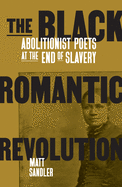
This urgent study of Black abolitionist poets before and after the Civil War demonstrates, with great incisive power, not just that figures like Albery Allson Whitman, Frances Ellen Watkins Harper and more drew inspiration from European Romantics like Byron in their revolution-minded verse. It also argues that the era's Black American poets, both free and enslaved, developed a singular Romantic tradition of their own, setting a lyric poetry touched with prophecy and whirlwinds to the task of breaking "the aesthetic and ideological bonds of slavery, racism, and capitalism." Their vision of freedom, Matt Sandler argues, remains unfulfilled, even today.
Sandler, director of the MA program in American Studies in the Center for the Study of Ethnicity and Race at Columbia University, challenges established ideas about the poets' relationship to Romanticism, but never gets bogged down in academic turf battles. Instead, he highlights the work, the poets and their political and cultural worlds, guiding readers through history, biography, theory and engaging close readings of the poems themselves. Especially welcome is Sandler's adoption of the lens of Black feminist theory and attention to the poets' emphasis on the sexual violence at the heart of the slave economy, a repugnant truth that belied the era's pervasive arguments for the plantation system's benevolence.
Sadler's examination of the poets' appropriations of American songs to spread their message is thrilling (one parody begins "My country! 'tis for thee/ Dark land of slavery,/ For thee, I weep"), as are the connections he draws to Toni Morrison and hip hop. The pages crash with contemporary resonance and 19th-century thunder. --Alan Scherstuhl, freelance writer and editor

